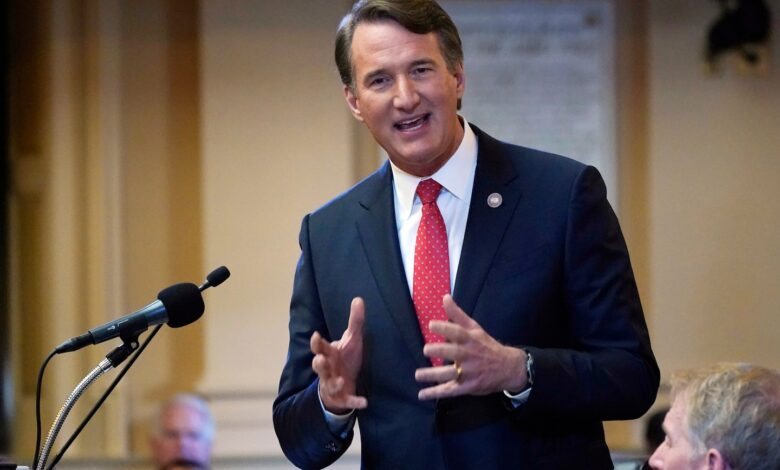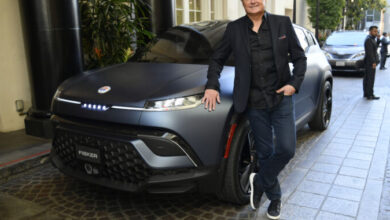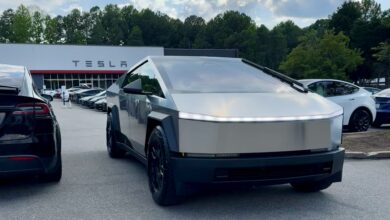Youngkin moves to lift Virginia’s strict auto emissions standards

“Once again, Virginia is declaring independence — this time from a misguided electric vehicle mandate imposed by unelected leaders nearly 3,000 miles away from the Commonwealth,” Youngkin said in a news release.
At an event Wednesday at the Loyalty Toyota dealership outside Richmond, Youngkin cast his action in patriotic terms. “It’s about celebrating freedom. It’s about celebrating the Virginia promise that you get to come to the commonwealth of Virginia, have an extraordinary life and make decisions over your life. But more importantly, this is about choosing what car you drive,” Youngkin said, standing in front of a gas-powered Chevrolet Silverado and Toyota Tundra as well as a line of American and Virginia flags.
Democrats accused him of overstepping his authority. “The governor seems to think we live in a dictatorship where only he decides what the law is,” state Senate Majority Leader Scott A. Surovell (D-Fairfax) said via text message, calling the action “destructive of Virginia’s pro-business reputation.”
This marks at least the second time Youngkin has circumvented environmental standards passed by Democratic majorities in the legislature. Last year, he ordered the state Air Pollution Control Board to exit the Regional Greenhouse Gas Initiative, or RGGI, a multistate compact in which energy producers trade carbon emissions credits. That move is the subject of a lawsuit filed by the Southern Environmental Law Center on behalf of environmental groups, arguing that the governor has no power to undo a law passed by the legislature.
On Wednesday, House Majority Leader Charniele L. Herring (D-Alexandria) said Youngkin’s effort to lift clean-car requirements fit the same pattern. “He’s showing his complete disregard for existing law by going around the General Assembly and pandering to corporate polluters,” Herring said in a statement.
State Sen. Lamont Bagby (D-Henrico), one of the sponsors of the original legislation, said the action would send consumers to other states to shop for vehicles. “Electric vehicles are the future, and the Governor needs to accept this, or Virginia will fall behind,” Bagby said in a news release.
California standards require zero-emission vehicles to make up at least 22 percent of new vehicle sales by the end of next year, or manufacturers must pay a penalty. Those standards are set to get even stricter, requiring all new vehicle sales to be zero-emission by 2035. Federal standards, by contrast, do not require phasing out sales of gas-powered vehicles and envision a slower transition to electric vehicles or other alternatives.
According to the Youngkin administration, electric vehicles amounted to 9 percent of overall vehicle sales in Virginia in 2023.
The California auto emissions standards were part of a package of environmental laws adopted by the Virginia General Assembly in 2021, when Democrats controlled both the Senate and House of Delegates. Under federal law, states must comply with auto emissions standards set by the Environmental Protection Agency, but California is allowed to adopt stricter standards, and states may choose to adhere to those instead.
Seventeen states and the District of Columbia have adopted California standards, and automakers often build to those specifications because adherents represent a major part of the vehicle market.
Youngkin has routinely blasted Virginia’s participation, saying the state should not let another government set its standards. He also appeared with other Republican governors in Louisiana on Monday to denounce President Biden’s energy policies, warning that walking away from “American-made energy” will drive the country “right into the stranglehold of China.”
On Wednesday, Youngkin also depicted his action on the clean-car requirements as a matter of national security, saying that Chinese companies dominate the supply chain for electric vehicles.
Senate Minority Leader Ryan T. McDougle (R-Hanover) joined the governor this week in asking Miyares for an opinion on whether the General Assembly’s action required the state to participate, and Miyares found this week that the legislation did not create a mandate.
The law says state regulators “may” participate in California standards, Miyares wrote. “The General Assembly knows how to express its intention and easily could have directed the Board to adopt standards identical to California’s,” he wrote.
In addition, Miyares noted that California’s air board recently adopted a new, even stricter version of the emissions standards, set to take effect next year. Because the Virginia Air Pollution Control Board adopted California standards that expire at the end of 2024, he said, the board would have to act again to adopt the new regime.
Standing with Youngkin at Wednesday’s event, Miyares added that an electric-vehicle mandate would impose a penalty on “working-class Virginians” and predicted that the governor would veto any attempt by the General Assembly to pass a new version of the law.
Virginia Secretary of Natural and Historic Resources Travis Voyles sent a letter this week to the air board informing its members that there will be no effort to adopt the new set of California guidelines. “Therefore, beginning in calendar year 2025, [the new California standards] will not be applicable in Virginia and car manufacturers will be free to sell new vehicles under current federal regulations,” Voyles wrote.
The American Fuel and Petrochemical Manufacturers trade association issued a statement applauding Youngkin for “following the will of the people who have made clear that they do not want politicians dictating what cars they can drive.”
Northern Virginia car dealer Tim Pohanka, legislative chairman of the Virginia Automobile Dealers Association, appeared at Youngkin’s event Wednesday and said that even though he drives an electric vehicle and sells many of them, he believes Virginia’s market is not ready for California’s aggressive sales targets.
Environmental groups cast the withdrawal as a step backward. “This decision will mean fewer vehicle choices, worse air quality, and higher fueling costs for Virginia drivers,” Walton Shepherd, Virginia director of the Natural Resources Defense Council, said in a news release.



